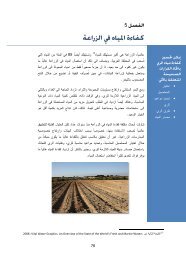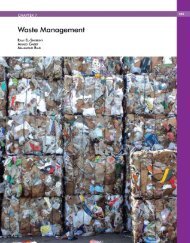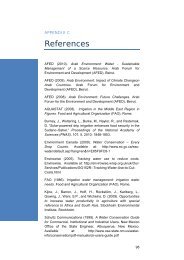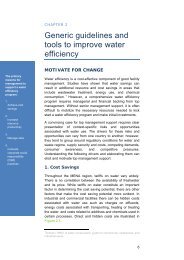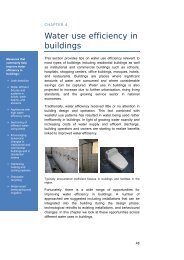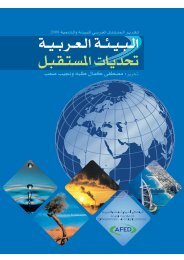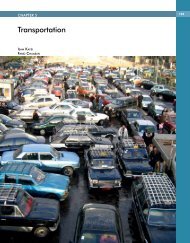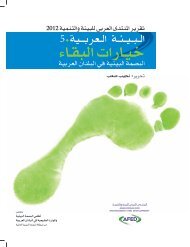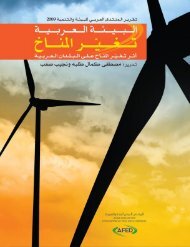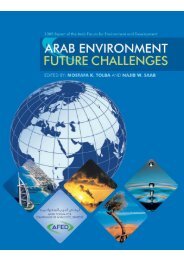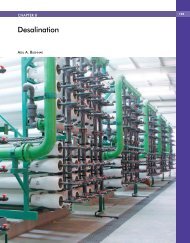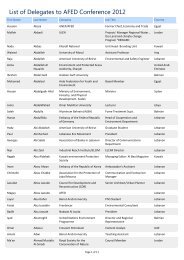Impact of Climate Change on Arab Countries - (IPCC) - Working ...
Impact of Climate Change on Arab Countries - (IPCC) - Working ...
Impact of Climate Change on Arab Countries - (IPCC) - Working ...
Create successful ePaper yourself
Turn your PDF publications into a flip-book with our unique Google optimized e-Paper software.
ARAB ENVIRONMENT: CLIMATE CHANGE<br />
XV<br />
Specific examples in the <strong>Arab</strong> world are the commercializati<strong>on</strong> <str<strong>on</strong>g>of</str<strong>on</strong>g> wind energy in<br />
Egypt; widespread use <str<strong>on</strong>g>of</str<strong>on</strong>g> solar heating in Palestine, Tunisia, and Morocco; the<br />
introducti<strong>on</strong> <str<strong>on</strong>g>of</str<strong>on</strong>g> compressed natural gas (CNG) as a transport fuel in Egypt; the<br />
first c<strong>on</strong>centrated solar power projects in Egypt, Tunisia, Morocco, and Algeria;<br />
the first two <strong>Arab</strong> green building councils in The UAE and Egypt; the massive<br />
forestati<strong>on</strong> program in the UAE; Masdar, the first zero-carb<strong>on</strong> city in Abu<br />
Dhabi; the pi<strong>on</strong>eering carb<strong>on</strong> capture and storage project in Algeria; and Jordan’s<br />
introducti<strong>on</strong> <str<strong>on</strong>g>of</str<strong>on</strong>g> duty and tax exempti<strong>on</strong>s to encourage the import <str<strong>on</strong>g>of</str<strong>on</strong>g> hybrid cars.<br />
However, most <str<strong>on</strong>g>of</str<strong>on</strong>g> these initiatives are fragmented and do not appear to have been<br />
implemented as part <str<strong>on</strong>g>of</str<strong>on</strong>g> a comprehensive policy framework at the nati<strong>on</strong>al level,<br />
let al<strong>on</strong>e at the regi<strong>on</strong>al <strong>on</strong>e.<br />
In a particularly promising development, the newly established Internati<strong>on</strong>al<br />
Renewable Energy Agency (IRENA) has chosen Masdar City in Abu Dhabi as<br />
the agency's first headquarters. This is not <strong>on</strong>ly very important for the developing<br />
world as a whole but will hopefully also lead to significant research and<br />
investments into renewable energy in the <strong>Arab</strong> regi<strong>on</strong>.<br />
<strong>Arab</strong>-<strong>Arab</strong> cooperati<strong>on</strong> can also be improved, for example in the areas <str<strong>on</strong>g>of</str<strong>on</strong>g> energy<br />
efficiency and renewable energy, the use <str<strong>on</strong>g>of</str<strong>on</strong>g> compressed natural gas as a transport<br />
fuel, and investing in carb<strong>on</strong> capture and storage. Given the importance <str<strong>on</strong>g>of</str<strong>on</strong>g> the<br />
fossil fuel industry in the <strong>Arab</strong> regi<strong>on</strong>, <strong>Arab</strong> countries have a vested interest in<br />
helping develop carb<strong>on</strong> capture and storage technology to help <str<strong>on</strong>g>of</str<strong>on</strong>g>fset emissi<strong>on</strong>s<br />
due to fossil fuels usage. Ultimately, if this technology can be made sufficiently<br />
viable, it will be an important part <str<strong>on</strong>g>of</str<strong>on</strong>g> global climate change mitigati<strong>on</strong> strategies.<br />
As fossil fuels will remain an important part <str<strong>on</strong>g>of</str<strong>on</strong>g> the energy mix in any future scenario,<br />
carb<strong>on</strong> capture and storage is an important area into which <strong>Arab</strong> scientists<br />
have to get involved and resources need to be devoted.<br />
PUBLIC PERCEPTION OF CLIMATE CHANGE<br />
AFED c<strong>on</strong>ducted a pan-<strong>Arab</strong> survey in order to explore awareness <str<strong>on</strong>g>of</str<strong>on</strong>g> climate<br />
change am<strong>on</strong>g the <strong>Arab</strong> public, their percepti<strong>on</strong>s <str<strong>on</strong>g>of</str<strong>on</strong>g> the need to take acti<strong>on</strong>, and<br />
their willingness to pers<strong>on</strong>ally c<strong>on</strong>tribute to climate change mitigati<strong>on</strong> and adaptati<strong>on</strong><br />
measures.<br />
The results <str<strong>on</strong>g>of</str<strong>on</strong>g> the survey showed increasing awareness: 98% believed that the climate<br />
is changing, and 89% believed this was due to human activities. 51%<br />
believed that governments were not acting adequately to address the problem,<br />
while 84% believed climate change posed a serious challenge to their countries.<br />
Over 94% believed that their countries would benefit from participating in global<br />
acti<strong>on</strong> to deal with climate change, and 93% pledged to participate in pers<strong>on</strong>al<br />
acti<strong>on</strong> to reduce their c<strong>on</strong>tributi<strong>on</strong> to the problem.<br />
Asked to choose sectors where climate change will have a major impact in their<br />
countries, it was notable that not a single resp<strong>on</strong>dent said there would be no<br />
effect at all. The majority, at the regi<strong>on</strong>al level, gave priority to health, drinking<br />
water and food, followed by coastal areas. Those surveyed were also asked to<br />
choose the three most important measures to mitigate the causes and to adapt to<br />
the effects <str<strong>on</strong>g>of</str<strong>on</strong>g> climate change. Changing c<strong>on</strong>sumpti<strong>on</strong> patterns, mainly reducing<br />
the use <str<strong>on</strong>g>of</str<strong>on</strong>g> energy, was the main measure chosen, followed by educati<strong>on</strong> and<br />
awareness. Ratifying and implementing internati<strong>on</strong>al treaties came third.



